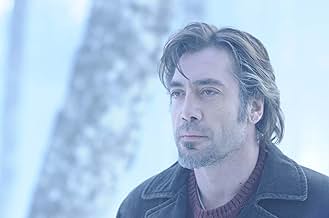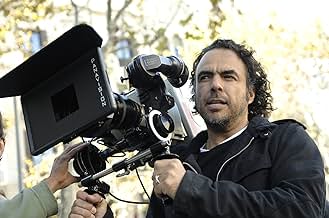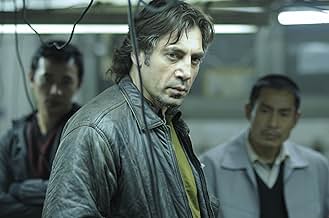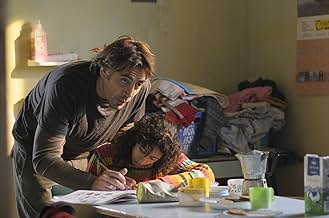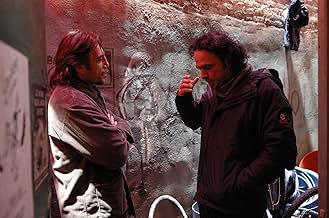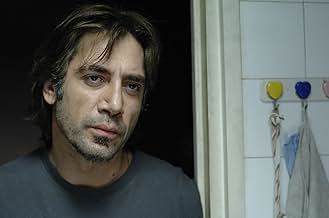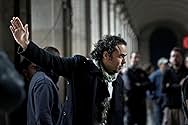Essa é a história de Uxbal, um homem que vive no nosso mundo, mas que também é capaz de ver a morte, que guia cada um de seus passos.Essa é a história de Uxbal, um homem que vive no nosso mundo, mas que também é capaz de ver a morte, que guia cada um de seus passos.Essa é a história de Uxbal, um homem que vive no nosso mundo, mas que também é capaz de ver a morte, que guia cada um de seus passos.
- Direção
- Roteiristas
- Artistas
- Indicado a 2 Oscars
- 21 vitórias e 65 indicações no total
Avaliações em destaque
10jzappa
Inarritu's three previous films---Amores Perros, 21 Grams and Babel---are classified together as the Death Trilogy, as they each depict the exponential impact of fatal or near-fatal occurrences in the interconnected existence of separate lives. They are each epic, punch-packing dramatic powerhouses. But now I see he still had much more to say on the literally infinite subject of death. And he says it with Biutiful, a purely experiential film that pierces through the heart with the acuity of a stingray barb.
The narrative here is a rail tunnel of raw, sprawling intimacy set in an overpopulated, decaying Barcelona ghetto. We follow Uxbal, and we're not entirely sure what he does. Neither does anybody, or him really. Much of the things he does are criminal, mainly mitigating between corrupt police and illegal aliens, with often catastrophic results. He is also a dedicated father to two young children whose mother, his ex-wife, is a wreck of alcohol, bipolarity and promiscuity, and worse, knows her inability to control herself and is in a quicksand of bettering herself. Uxbal also has prostate cancer, which is rapidly spreading. Also, he is internally connected with the afterlife. He doesn't see visions, he doesn't clutch shoulders and see the manner of one's impending death. He purely senses a recently deceased spirit in the room with him. He can do nothing about their situation. He just senses them.
Uxbal's ability to feel the presence of departed souls is portrayed like a sort of capacity to hear noise at the volume at which, say, a dog could only be expected to hear it. The film's setting and happenings are a jerky, spontaneous, lateral rush of urban business, like the sight, sound and fury made by the living to distract themselves from the silence of death. Each scene seems to be a concordance of extroverted behavior and internal behavior, both with equal fervor, yet both on either side of some two-way mirror. Only those characters, namely Uxbal, whose conflicts and dilemmas are constantly internalized, can hear that silence. Eventually, his daughter does as well, and becomes the closest to him, in what one might go as far as to consider the film's climax, a bear-like hug they both know is as fleeting as every other action in this desperate commotion of a life they lead.
Iñárritu intends to drain us. Physically, internally, emotionally. And he cleans out his total cinematic armory to do so. And like death, that is both a blessing and a curse. For however harrowing it is, Biutiful exalts us with the chance to see soul bare, through Javier Bardem's performance as Uxbal. Watching Bardem absorb, involve and ultimately possess a many-sided role like Uxbal's is a singular delicacy, and a complete wonder. His eyes speak agonizing tomes. He hauls from an unfathomably mysterious spring of passion, grief, and who knows what else.
One might be able to delineate that Bardem renders a tragic individual as a fading Barcelona forager who deals in illegal immigrants and connects with the deceased. But every now and then, a story materializes, conveyed in a way that is so sprawling, so comprehensive, that no one premise or implication can classify it. Attempting to definitely describe it limits something that offers the utmost magnitude of whatever an actor's, a filmmaker's, and viewer's, understanding. That is what makes Biutiful so precious.
The narrative here is a rail tunnel of raw, sprawling intimacy set in an overpopulated, decaying Barcelona ghetto. We follow Uxbal, and we're not entirely sure what he does. Neither does anybody, or him really. Much of the things he does are criminal, mainly mitigating between corrupt police and illegal aliens, with often catastrophic results. He is also a dedicated father to two young children whose mother, his ex-wife, is a wreck of alcohol, bipolarity and promiscuity, and worse, knows her inability to control herself and is in a quicksand of bettering herself. Uxbal also has prostate cancer, which is rapidly spreading. Also, he is internally connected with the afterlife. He doesn't see visions, he doesn't clutch shoulders and see the manner of one's impending death. He purely senses a recently deceased spirit in the room with him. He can do nothing about their situation. He just senses them.
Uxbal's ability to feel the presence of departed souls is portrayed like a sort of capacity to hear noise at the volume at which, say, a dog could only be expected to hear it. The film's setting and happenings are a jerky, spontaneous, lateral rush of urban business, like the sight, sound and fury made by the living to distract themselves from the silence of death. Each scene seems to be a concordance of extroverted behavior and internal behavior, both with equal fervor, yet both on either side of some two-way mirror. Only those characters, namely Uxbal, whose conflicts and dilemmas are constantly internalized, can hear that silence. Eventually, his daughter does as well, and becomes the closest to him, in what one might go as far as to consider the film's climax, a bear-like hug they both know is as fleeting as every other action in this desperate commotion of a life they lead.
Iñárritu intends to drain us. Physically, internally, emotionally. And he cleans out his total cinematic armory to do so. And like death, that is both a blessing and a curse. For however harrowing it is, Biutiful exalts us with the chance to see soul bare, through Javier Bardem's performance as Uxbal. Watching Bardem absorb, involve and ultimately possess a many-sided role like Uxbal's is a singular delicacy, and a complete wonder. His eyes speak agonizing tomes. He hauls from an unfathomably mysterious spring of passion, grief, and who knows what else.
One might be able to delineate that Bardem renders a tragic individual as a fading Barcelona forager who deals in illegal immigrants and connects with the deceased. But every now and then, a story materializes, conveyed in a way that is so sprawling, so comprehensive, that no one premise or implication can classify it. Attempting to definitely describe it limits something that offers the utmost magnitude of whatever an actor's, a filmmaker's, and viewer's, understanding. That is what makes Biutiful so precious.
I must say... I watched this movie twice. At first brush... I couldn't quite get past the pain and heaviness of the film... and at second screening, I really got to enjoy the (biutiful) visual metaphors that the director wanted to paint for us. It is indeed grim... and human. Like life, and perhaps a reflection of these days, not everything ends up happily ever after... we all are surviving each day in our own ways. This slice of family life, in a small quarter of Barcelona, is not glossed over and prettied up like most Hollywood films that we've slowly grown to despise (I know I don't speak for everyone). This is not the film that you go to to escape from reality... it's reality facing right back at you. It paints a perspective on the lives of those living on the frayed edges of our society, in every part of the world. For me, I think it is a pity that none of the Big Six picked it up for wider distribution. And that's the sad note for today's American cinema.
A father's love for his children amidst the everyday life of crime in Barcelona. This encapsulates pretty much the basic premise of this movie, and has said nothing about the content or merit.
I'm sure quite a few reviews about this disturbing but nevertheless transcendent film will be written here. Next to the praise, a lot of people will be appalled, others indifferent, then there will be the ones who complain that Biutiful is nothing more than showing our bad world being bad.
It may be that, but it is also full of promise and dare one say it, love. And it would be foolish to ignore the hope that can be seen amidst the pain and chaos. Iñárritu shows us that we as human are able to care, for ourselves and each other.
And if nothing else, "Biutiful" proves, now officially, that Javier Bardem is one of the greatest contemporary actors.
Felicidades y gracias
I'm sure quite a few reviews about this disturbing but nevertheless transcendent film will be written here. Next to the praise, a lot of people will be appalled, others indifferent, then there will be the ones who complain that Biutiful is nothing more than showing our bad world being bad.
It may be that, but it is also full of promise and dare one say it, love. And it would be foolish to ignore the hope that can be seen amidst the pain and chaos. Iñárritu shows us that we as human are able to care, for ourselves and each other.
And if nothing else, "Biutiful" proves, now officially, that Javier Bardem is one of the greatest contemporary actors.
Felicidades y gracias
"Biutiful" is devastating. Not only isn't it a comfortable and audience-pleasing film but in this case the story's really shocking, well acted and directed and, overall, terribly sad. The film is basically about good and evil, death and life and similar topics. These themes are very effectively expressed in its atmospheric and innovative photography. Iñarritu's camera gets to detect images of fierce and brilliance in the squalor. Javier's face is painted with light and shadows, as well as with a sinister appearance suggesting strong contrition and redemption. Uxbal's efforts to make some generous deeds before his death are rendered in a terrific performance, which manages to elevate the bleak subject to a sublime level. "Biutiful" is a work of extraordinary vitality and humanity, with figures of untarnished quality (Uxbal's children and the Senegalese immigrant who'll raise them after his death). On a personal level Uxbal comes to terms with the close death but eventually shows a vision of reconciliation with the life he must leave behind. Watching the film is a really a must.
What would you do if you knew that you have a few months to live and a life full of problems and unresolved issues? That's what happened to the central character of this film, a production made halfway between Spain and Mexico, skillfully directed by Alejandro González Iñarritu. The film is set in Barcelona and the main character, Uxbal, is a dubious individual who has a close relationship with organized crime and is far from the likable type that we easily like. In addition to his illegal business, which goes relatively poorly due to various problems and setbacks, Uxbal has an alcoholic, bipolar wife from whom he is, in effect, estranged, and two beloved children who are the real joy he has in life.
The film is interesting and tackles difficult, indigestible and complex topics. I can't say that it's the type of film I would recommend to a friend, because I think it's a film that lacks a certain disposition, on the part of the public, to be properly appreciated. It is not an easy film, nor does it seek to capture our sympathy, although it ends up doing so because of the way we see that man suffering. We see beyond what he does and says, we see that deep down he is not a bad man. Still, it's a depressing film and one that leaves us with a feeling of emptiness and dissatisfaction at the end.
With this film, Javier Bardem had a character and material tailored to what the actor knows and is capable of doing. It's no secret that Iñarritu wanted him to be the protagonist from the start, and Bardem rewarded him by giving him a dose of commitment, experience and professionalism that anyone who wants to see the film can see. The actor is excellent and does a truly impeccable, deep, emotional job here. The film also has good performances from other actors, such as Hanaa Bouchaib, Guillermo Estrella and Maricel Álvarez, but it is Bardem's overwhelming performance that delights us and sustains the entire film.
Technically, what caught my attention the most was the excellence of the resources and sound effects and their dexterous and competent use. It is in the details that the best qualities are found, such as the absence of echo, the sound clarity, the good sound effects used or even situations like the sound of the heartbeats of two actors, when they embrace. In addition, the visual features, cinematography and editing also deserve praise.
The film is interesting and tackles difficult, indigestible and complex topics. I can't say that it's the type of film I would recommend to a friend, because I think it's a film that lacks a certain disposition, on the part of the public, to be properly appreciated. It is not an easy film, nor does it seek to capture our sympathy, although it ends up doing so because of the way we see that man suffering. We see beyond what he does and says, we see that deep down he is not a bad man. Still, it's a depressing film and one that leaves us with a feeling of emptiness and dissatisfaction at the end.
With this film, Javier Bardem had a character and material tailored to what the actor knows and is capable of doing. It's no secret that Iñarritu wanted him to be the protagonist from the start, and Bardem rewarded him by giving him a dose of commitment, experience and professionalism that anyone who wants to see the film can see. The actor is excellent and does a truly impeccable, deep, emotional job here. The film also has good performances from other actors, such as Hanaa Bouchaib, Guillermo Estrella and Maricel Álvarez, but it is Bardem's overwhelming performance that delights us and sustains the entire film.
Technically, what caught my attention the most was the excellence of the resources and sound effects and their dexterous and competent use. It is in the details that the best qualities are found, such as the absence of echo, the sound clarity, the good sound effects used or even situations like the sound of the heartbeats of two actors, when they embrace. In addition, the visual features, cinematography and editing also deserve praise.
Você sabia?
- CuriosidadesJavier Bardem's part in this film is the first time that a performance entirely in the Spanish Language has been nominated for an Academy Award Best Actor Oscar.
- Erros de gravaçãoIn the scene where there are three dead boys lying, the hands of the middle boy changes in between shots.
- Cenas durante ou pós-créditosDedication shown before ending credits: "To my beautiful old oak...Héctor González Gama, my father"
- ConexõesFeatured in The Tonight Show with Jay Leno: Episode #19.61 (2010)
- Trilhas sonorasComo te extraño mi amor
Performed by Café Tacvba
Written by Leo Dan (as Leopoldo Dante Tévez)
Courtesy of Warner Music México, S.A. De C.V.
Publishing Emi Music Publishing
Principais escolhas
Faça login para avaliar e ver a lista de recomendações personalizadas
- How long is Biutiful?Fornecido pela Alexa
Detalhes
- Data de lançamento
- Países de origem
- Centrais de atendimento oficiais
- Idiomas
- Também conhecido como
- Những Giây Phút Cuối
- Locações de filme
- Empresas de produção
- Consulte mais créditos da empresa na IMDbPro
Bilheteria
- Faturamento bruto nos EUA e Canadá
- US$ 5.101.237
- Fim de semana de estreia nos EUA e Canadá
- US$ 457.206
- 30 de jan. de 2011
- Faturamento bruto mundial
- US$ 25.147.786
- Tempo de duração2 horas 28 minutos
- Cor
- Mixagem de som
- Proporção
- 2.35 : 1
Contribua para esta página
Sugerir uma alteração ou adicionar conteúdo ausente


![Assistir a Tráiler [OV]](https://m.media-amazon.com/images/M/MV5BZjNkYzhlODMtNjc2YS00ZDAwLWIyMGUtNmNhOTY3N2VhMDU1XkEyXkFqcGdeQXRodW1ibmFpbC1pbml0aWFsaXplcg@@._V1_QL75_UX500_CR0)


